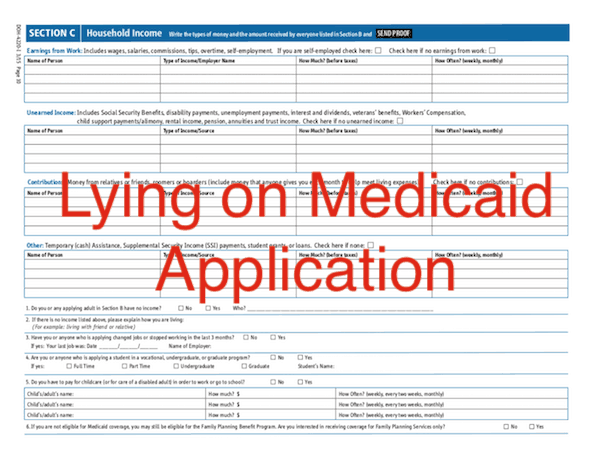
If you are lying on a Medicaid application in New York City, you may eventually get caught. There are multiple signals that can get you caught lying to Medicaid. Medicaid is run by the government, and the government frequently cross-references their Medicaid recipient databases with databases that contain people’s income, asset and household information.
Some of these databases include
- IRS tax filings
- Payroll tax filings from your employer
- Register of Deeds
- Declarations of Corporations
- Marriage Records
- Birth Records
- Utility Bills
- Records of Using Medicaid
If you are being accused of Medicaid fraud and you are looking to consult with a Medicaid fraud lawyer, you can send us an email at [email protected] or call us at 212-233-1233.
IRS tax filings can include form 1040 and the like, and they can show that your income exceeds Medicaid limits. An IRS tax filing can also show that the father is supporting the children, when the father declares the children as his dependents. Payroll tax filings that your employer files with the IRS, which includes form W2 and the like, can also show income.
Register of Deeds has records of your property ownership, which can indicate that you are receiving rental income or that you are a part of a household.
A Declaration of Corporation can get you caught lying on a Medicaid application because it indicates that you are receiving business income, including cash income, that you are not reporting to Medicaid.
A Marriage Certificate or Birth Certificate can indicate that you have a household member, typically the husband, whom you are not including on the Medicaid application as a part of your household. If he is married to you or is the father of the children, Medicaid can argue that you were lying on the Medicaid application by not including him.
Using Medicaid outside of the state you are receiving it in can indicate that you don’t qualify for Medicaid in that state. For example, if you are using New York Medicaid in Florida, it can be a sign that you are not a New York resident and are lying on the Mediciad application.
If any of those databases receive a hit, the computer will alert the DSS IREA BFI (Department of Social Services Bureau of Fraud Investigations). A supervisor will review the signal and if appropriate, assign your case to a human investigator. The investigator then will start an investigation to determine whether or not you are actually lying on the Medicaid application. If they determine that you are lying, they will gather enough evidence to secure a criminal conviction.
People can also get caught lying on a Medicaid application when a fraud investigator is sent out to their residence or place of employment in order to conduct surveillance and investigation. The department of fraud investigation can send out an investigator when your application gets cross-referenced in a database or looks suspicious for another reason.
After the Medicaid Fraud investigator has conducted the investigation and gathered all the evidence they can, they will then send you a letter asking you to come in for an interview. By that point, they typically have enough evidence for a criminal conviction, and are just trying to get you to admit that you have committed Medicaid Fraud.
At a Medicaid fraud investigator interview, there is a difference between not volunteering information and providing false information. Providing false information to the investigator can come with a serious jail sentence.
Don’t think you can fool HRA investigators. They probably already have the evidence of you lying on the Medicaid application. They have whatever information triggered the investigation. That’s why they have sent you a Medicaid fraud investigation letter. They’ve probably interviewed the institution where that information came from, such as a bank, school, place of work, or government agency. They probably already have documents that show that you are not eligible.
On the flip side, maybe the HRA does not have enough information of you lying on the Medicaid application, so they are trying to get it from you. But it is also possible that they are trying to get you to lie, to add obstruction of justice as an extra criminal charge. You don’t want to be taking those chances.
Look at the recent high-profile convictions. Most of them had to do with lying to the investigators, some even more than the underlying fraud.
You have the right to remain silent. But not to lie to Medicaid investigators.
People get caught lying on a Medicaid application every day. If you received a letter from the HRA DSS IREA BFI, speak to a Medicaid Fraud lawyer today. We at the Law Offices of Albert Goodwin are here for you. We have offices in New York City, Brooklyn, NY and Queens, NY. You can call us at 212-233-1233 or send us an email at [email protected].













